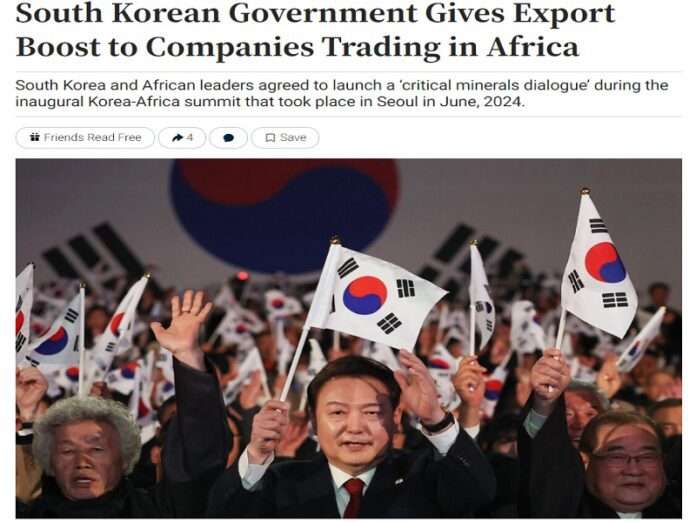The “Fourth Industrial Revolution”/“Great Reset” (4IR/GR) will define global economic trends over the coming decades, but all related technologies are dependent on certain critical minerals like cobalt, many of which are located in Africa. China controls most of that mineral’s production as well as lithium, which is why its competitors want to diversify from their dependence on its supply chains, ergo the rush for extracting African resources like the Republic of Korea (ROK) sought to do via its inaugural Africa Summit.
It’s not the only one doing this either since the Financial Times published a detailed report in late May titled “The UAE’s rising influence in Africa”, which documents its growing role in this industry there. China’s Indian neighbor, with whom it’s been in a fierce competition since their lethal clashes over the Galwan River Valley in summer 2020, is also looking to expand its associated presence in Africa per Reuters. It goes without saying that Western countries are doing the same as well for identical purposes.
The combined effect is that China’s disproportionate control over critical mineral supply chains will likely erode with time as the ROK, the UAE, India, the EU, and the US all make competitive bids to develop new African deposits and production sites whether there or wherever else. The larger context within which this is unfolding concerns the New Cold War competition between China and the US over the future of the ongoing global systemic transition.
China wants a greater role for itself in global governance, which it believes can only be achieved by strengthening its relations of complex economic interdependence with the rest of the world, particularly through its dominant role in critical mineral and other supply chains. By contrast, the US wants to preserve the West’s traditional role atop the informal post-World War II international hierarchy, to which end it seeks to help China’s partners diversify from their complex economic interdependence with it.
Africa is a pivotal battleground in this competition due to the role that its mineral wealth will play in the 4IR/GR, and its growing population also makes it one of the most attractive emerging markets as a whole anywhere in the world too. China requires reliable access – and from its perspective, privileged access as well – to these minerals and equally reliable (and privileged) access to their markets in order to continue growing, which the US and its likeminded partners want to deny it in order to manage China’s rise.
China has created vast influence networks all across resource-rich African states over the past decade through its Belt & Road Initiative (BRI), which offers low-interest loans for infrastructure projects without demanding that the recipient tweak their domestic political system like the West does. This laissez-faire approach has proven very attractive, but it also fueled corruption, thus creating patronage networks between their elite and China regardless of whether or not this was Beijing’s intent like some speculate.
While the West still attaches political strings to its loans, its non-Western partners like the ROK, the UAE, and India follow the Chinese model of eschewing such requirements, though they’re also much more careful to avoid inadvertently fueling corruption. This approach might resonate much more with the masses, some of whom have begun to espouse anti-government sentiment over the past decade as a reaction to BRI-related corruption (whether perceived or objectively existing).
China might therefore soon find itself in a dilemma since the critical minerals and emerging markets that it requires for maintaining its economic growth are dependent on reportedly corrupt and in some cases increasingly unpopular African governments. Beijing can’t encourage self-reform on their part without hypocritically doing the exact same thing that it criticizes the West for and risking accusations of meddling. At the same time, if left unchecked, these trends could lead to instability and regime change.
The removal of pro-Chinese elites from power, who could be replaced by the comparatively less corrupt elite that its competitors aim to cultivate via their mineral and other deals, could complicate those countries’ BRI repayment programs if the new authorities renegotiate the terms after discovering that the initial ones were lopsided or exploited by their corrupt predecessors. This scenario poses a serious challenge to China’s dominant position in Africa and it’s unclear how it’ll deal with these latent threats.
Excerpts from this interview were included in Nalova Akua’s article for The Epoch Times titled “South Korean Government Gives Export Boost to Companies Trading in Africa”.







